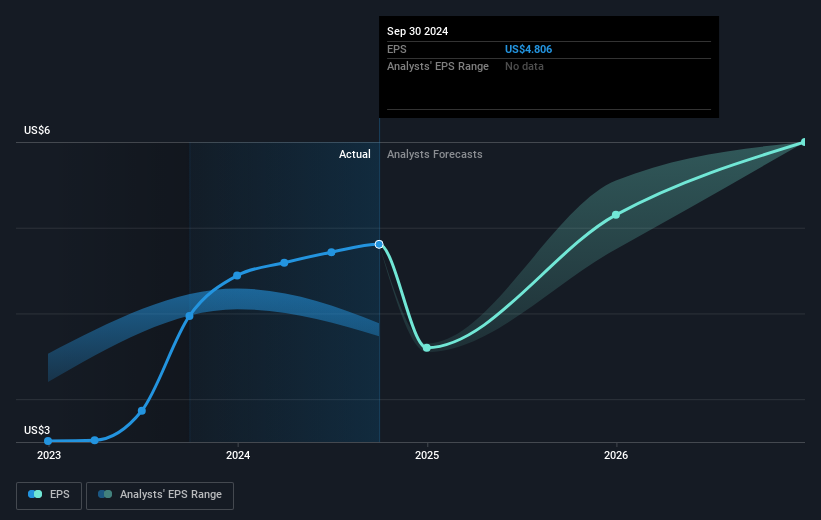- United States
- /
- Insurance
- /
- NYSE:CNA
CNA Financial's (NYSE:CNA) one-year total shareholder returns outpace the underlying earnings growth

On average, over time, stock markets tend to rise higher. This makes investing attractive. But if you choose that path, you're going to buy some stocks that fall short of the market. Unfortunately for shareholders, while the CNA Financial Corporation (NYSE:CNA) share price is up 17% in the last year, that falls short of the market return. Having said that, the longer term returns aren't so impressive, with stock gaining just 8.8% in three years.
While the stock has fallen 5.2% this week, it's worth focusing on the longer term and seeing if the stocks historical returns have been driven by the underlying fundamentals.
View our latest analysis for CNA Financial
In his essay The Superinvestors of Graham-and-Doddsville Warren Buffett described how share prices do not always rationally reflect the value of a business. By comparing earnings per share (EPS) and share price changes over time, we can get a feel for how investor attitudes to a company have morphed over time.
During the last year CNA Financial grew its earnings per share (EPS) by 21%. It's fair to say that the share price gain of 17% did not keep pace with the EPS growth. Therefore, it seems the market isn't as excited about CNA Financial as it was before. This could be an opportunity. The caution is also evident in the lowish P/E ratio of 10.03.
The image below shows how EPS has tracked over time (if you click on the image you can see greater detail).

We know that CNA Financial has improved its bottom line lately, but is it going to grow revenue? If you're interested, you could check this free report showing consensus revenue forecasts.
What About Dividends?
As well as measuring the share price return, investors should also consider the total shareholder return (TSR). The TSR is a return calculation that accounts for the value of cash dividends (assuming that any dividend received was reinvested) and the calculated value of any discounted capital raisings and spin-offs. So for companies that pay a generous dividend, the TSR is often a lot higher than the share price return. We note that for CNA Financial the TSR over the last 1 year was 27%, which is better than the share price return mentioned above. And there's no prize for guessing that the dividend payments largely explain the divergence!
A Different Perspective
CNA Financial's TSR for the year was broadly in line with the market average, at 27%. Most would be happy with a gain, and it helps that the year's return is actually better than the average return over five years, which was 9%. Even if the share price growth slows down from here, there's a good chance that this is business worth watching in the long term. While it is well worth considering the different impacts that market conditions can have on the share price, there are other factors that are even more important. Consider risks, for instance. Every company has them, and we've spotted 2 warning signs for CNA Financial you should know about.
Of course CNA Financial may not be the best stock to buy. So you may wish to see this free collection of growth stocks.
Please note, the market returns quoted in this article reflect the market weighted average returns of stocks that currently trade on American exchanges.
New: AI Stock Screener & Alerts
Our new AI Stock Screener scans the market every day to uncover opportunities.
• Dividend Powerhouses (3%+ Yield)
• Undervalued Small Caps with Insider Buying
• High growth Tech and AI Companies
Or build your own from over 50 metrics.
Have feedback on this article? Concerned about the content? Get in touch with us directly. Alternatively, email editorial-team (at) simplywallst.com.
This article by Simply Wall St is general in nature. We provide commentary based on historical data and analyst forecasts only using an unbiased methodology and our articles are not intended to be financial advice. It does not constitute a recommendation to buy or sell any stock, and does not take account of your objectives, or your financial situation. We aim to bring you long-term focused analysis driven by fundamental data. Note that our analysis may not factor in the latest price-sensitive company announcements or qualitative material. Simply Wall St has no position in any stocks mentioned.
About NYSE:CNA
CNA Financial
An insurance holding company, primarily provides commercial property and casualty insurance products in the United States and internationally.
Established dividend payer and good value.
Similar Companies
Market Insights
Community Narratives




